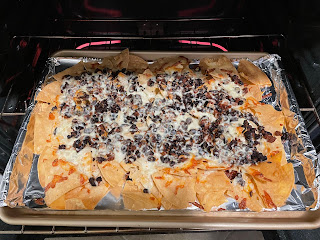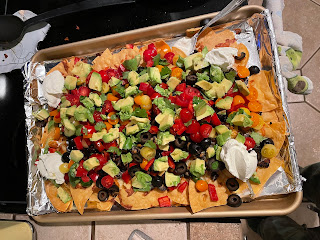Dear nachos,
There are few things in life that bring me as much joy as food. Food is nourishing, food supports my lifestyle and activities, food energizes my body and mind.
But not all food is nachos. And not all nachos are my nachos. Nachos are pure joy in food form. Sure, my nachos are piled high with sliced tomatoes, black olives, bell peppers, jalapeño, cilantro, and avocado, all of which are quite nourishing and healthy. My nachos also use home-cooked black beans and soy chorizo (same taste, less grease, no pigs). Even the cheese has nutritional value. In fact, the only unhealthy aspect of nachos are the chips.
 |
| Multicolor tomatoes, red bell pepper, green jalapeño, and black olives make nachos sort of nutritious. |
Chips, and the genuine mountain of nachos. The absurd quantity is definitely not healthy. My nachos begin on a cookie sheet lined with foil, chips spread from end to end, and everything else layered on top. Nachos bring me more joy than the sum of its parts. Nourishment is not why every other Wednesday is nacho night.
I fully understand and appreciate (and, if I’m honest, pity) that many people have strained relationships with food. Many must see food as nutrition only, certainly not as a reward. Others are uninterested in food, seeing it only as a way to keep their bodies going. One person even told me that eating is a waste of time and it’s too bad that bodies need food. Far too many people are unskilled at making food and depend on re-heating and take-out. Some go so far as to forget to eat when they are busy or stressed. For a year and a half, I lived with someone who had such a difficult relationship with food that she ate the absolute bare minimum required to stay alive and not a molecule more.
 |
| Nacho mountain! |
But to me, food is love. Eating food I love is self care. Making food is how I show love for others. One of my greatest joys is cooking and baking for others. Yes, I relish the enthusiastic praise for my food gifts, but I equally love gifting food when I don’t have the opportunity for praise. It’s a gesture of appreciation and community.
Food is also how I accept love from others. I have frequently told my husband that it’s his job to feed me (a task he takes seriously to ward off my hanger). I long for a dishwasher and don’t love the task of cleaning up after meals, but sitting down to a home-cooked meal he prepared makes me feel loved. Same when he buys take-out, double when he treats me to a coffee or brings home cookies from our favorite bakery. Similarly, there’s a reason we don’t get sushi take-out. Sitting at the table with friends, sharing drinks and appetizers, and swapping pieces of our rolls brings us closer together. Eating together is an act of love.
Cooking and baking are my creative outlets. I sprinkle massive flakes of finishing salt on my chocolate chip cookies to enhance the flavor of the chocolate and make them fancier. I enjoy trying new cake recipes in search of the one perfect cake, practicing my frosting skills, and experimenting with recipes to make them my own. My nachos are art. We call layering the rainbow of veggies over the baked tray "decorating". Because it is. They are as pretty to look at as they are delicious to eat. Well, almost.
 |
| "Decorated" nachos piled with avocado, cilantro, and all the other veggies. |
My nachos are why I can’t order nachos anywhere else. I’m a nacho purist. Some might say I’m a snob. My food opinions are strong and unyielding, especially when it comes to something I’ve perfected. The best compliment I’ve ever received was that my food opinions are to be trusted. My nacho opinions are:
- Cheese sauce does not belong on nachos (the only cheese we use is pepper jack)
- Jalapeños should be fresh, not pickled
- Chip structure and integrity is everything (we have a Costco membership almost exclusively for the toddler-sized double-bag of tortilla chips)
- Nachos are not a vessel for hot sauce (hot sauce it up, but don't drown them... oddly, we use sriracha)
Yet nachos are infinitely customizable. Sometimes we add sour cream. People can put meat on their nachos. Nachos can pay homage to other cultures and accommodate dietary restrictions. They're naturally gluten free! The advances in meltable vegan cheese means they can even be vegan now!
 |
| Cheesy baked nachos with black beans and soy chorizo. |
I’ve written about nachos for a college paper, preached my nacho opinions to anyone who will listen (or at least humor me), invited friends to share in nacho night, and moved nacho night when other obligations have meant we would not be able to fully enjoy the experience. On nacho night I lovingly craft each chip with each ingredient for the perfect bite. I hope my last meal is nachos.
When the rest of the world has gone to utter shit, nachos are the bright light that make me forget, for an hour, that there are so many things I can't control or influence, so many wrongs I can't right, so many mistakes I've made. For that hour everything is OK because I have my nachos.
 |
| Sometimes we add sour cream to nachos if we have it. |
Nachos, you are perfect and I love you.
















